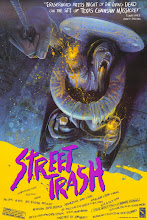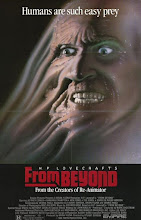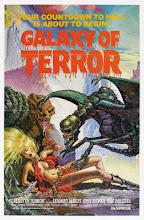When Jennifer Kent's The Babadook took home the awards for best film, direction and original screenplay at last years AACTAs (our equivalent of the Oscars) it was a surprise, and an auspicious moment for Australian genre cinema. I was amazed that our Academy (and the AFI) had the guts to recognise that a horror movie could be taken seriously enough to be considered worthy of the top honours. That the Spierig's Predestination and David Michôd's The Rover also walked away with awards surely makes this a completely unprecedented event at a major mainstream awards ceremony.
I finally got around to watching The Babadook last night and was suitably impressed. Although it owes perhaps a bit too much of a debt to The Shining in parts, Kent's movie is an effective, unsettling exploration of domestic anxiety, the rigours of single parenthood, grief and madness. Some spoilers follow.
It shares a similar premise to Maury and Bustillo's masterful Inside, in that the main protagonist is a single mother struggling with grief at the loss of her husband in a car crash. The difference here is that The Babadook's Amelia is also fighting a deep seated resentment towards her son Sam, because the fatal crash occurred while her husband was driving her to the hospital to give birth to him. The other major distinction between the two movies is that where the threat to Sarah and her unborn child came from outside (ironically enough), the threat to Amelia and Sam's domestic happiness comes very much from within. Both movies offer a very welcome feminist viewpoint in a genre that is still sorely lacking in that department.
One of The Babadook's strengths lies in the way it subtly plays with the shifting power dynamics between Amelia and her son Sam. What initially appears to be a cut and dried case of a single mother trying to cope with a highly challenging and precocious child soon morphs into something far more sinister. At a certain point it becomes apparent that this is more a case of a child trying to cope with a mother who may be slipping dangerously into the abyss. It's not all black and white however, and the movie does a good job of highlighting the complexity of parent/child relationships and how fears and resentments can snowball out of a vicious circle of behaviours from both sides.
Much has been made of how terrifying this film is, but I have to admit that I think its scariness has been exaggerated to a large degree. The usual hyperbole that comes along with a well regarded, much hyped horror movie. There are some very creepy moments, but for me they stemmed more from the film's titular children's book, rather than any reveal of the creature itself or Amelia's infanticidal tendencies.
There are some very striking qualities to The Babadook which have to be mentioned. Alex Holmes' production design and Radek Ladczuk's cinematography, although overly stagy at times, combine to create a powerful visual metaphor for depression and anxiety. The film's look, with its oppressively dour colour palette of grey on grey, effectively conveys what the world might look like through the eyes of someone who is suffering through the pain and torment of extreme depression. At times it recalls the nightmarish settings of Lynch's Eraserhead, at others the gothic, shadowy expressionism of Murnau and Wiene, with whom director Kent has an obvious affinity.
The other thing that made an immediate impression on me was the film's editing style. Simon Njoo has cut the film in a choppy, rapid-fire manner that reminded me of the visual narrative technique employed by editor Jay Rabinowitz in Aronofsky's Requiem for a Dream. As well as being an efficient storytelling technique, this also lends a sense of urgency and anxiety to the film, which (as with the aforementioned production design and cinematography) imbues it with a menacing sense of looming danger and madness.
In the end I'm slightly torn about my feelings for The Babadook, and I feel like I admire it more than outright like it. Jennifer Kent's debut - although very strong in some respects - is a bit too beholden to its influences, making it somewhat predictable and cliched in parts. It's also relentlessly bleak, and I can't really see myself returning for a repeat viewing anytime soon. This suburban nightmare is definitely worth a watch though, and marks another highpoint for Australian horror.














































